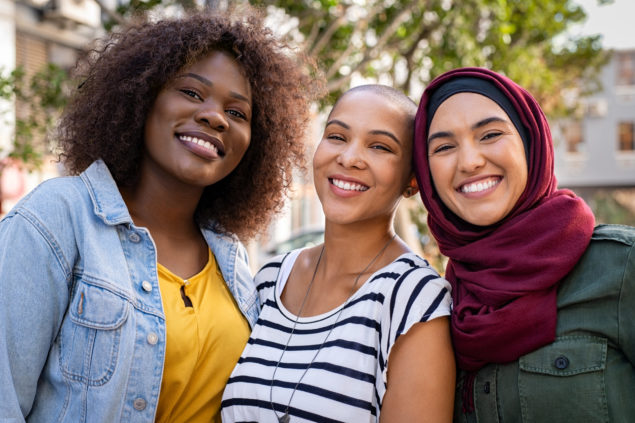Stories of Immigrants: Giovanna Romero Sarubbi
Monday | May 3, 2021 | by Wilma Lee

World Education Services (WES) believes in the power of storytelling and shared resources. In 2019, we reached out to immigrants across North America. We asked about their reasons for leaving home, their challenges along the way, and the advice they would like to share with other newcomers.
In this new blog series, we are now sharing their stories with you. Below is Giovanna’s.
Click here to hear from others who have contributed their voices to WES.
Giovanna remembers being drawn to travel and was curious about other cultures as a child. In Paraguay, where she grew up, her mother worked as a teacher at a binational center called the Centro Cultural Paraguayo Americano (CCPA). It was through handouts her mother picked up at a teacher’s conference that Giovanna first learned about opportunities to study in the United States.
Now, Giovanna has a B.A. in Communications from Dordt University in Iowa. She is currently pursuing an M.S. in International Education Development from the University of Pennsylvania.
At 28 years old, she is working on Optional Practical Training (OPT) as a coordinator at the UPenn’s Hub for Equity, Anti-Oppression, Research and Development (HERD). But she is wrestling with the limitations she faces a result of her F-1 visa status.
Below, learn about her journey and discover the advice that she would give others who would like to follow in her footsteps.
The Scholarship
During her school years in Paraguay, Giovanna was aware of the weaknesses in the education system. By the time she was a junior in high school, she aspired to study abroad—but had no idea how to pay for it.
From CCPA (where her mother worked), Giovanna learned about EducationUSA. Advisors there introduced her to the Opportunity Funds Program, which helps promising students who are likely to be awarded full scholarships in America. She was accepted into the program, and was granted funds to cover her college applications, as well as SAT preparation and airfare to the U.S.
The Opportunity Funds Program required her to apply to a minimum of three universities: one very competitive one, one middle option, and one “safe choice.” They provided her with a big booklet of schools to learn more about so that she could make informed choices. Giovanna was accepted to Dordt University and earned a scholarship that covered 80% of her tuition.
Giovanna was grateful for all of the help from EducationUSA. In addition to connecting her with the program that made her dreams possible, they connected her with information about moving to a new country. She also connected with students from previous cohort of the Opportunity Fund Program to ask about classes, financial aids, and campus life. Giovanna relied heavily on those resources and remarked that dedicated help like that is “very powerful in a small country like Paraguay.”
Undergraduate Life in Iowa
Giovanna was impressed by Dordt University for a number of reasons, including its focus on Christianity. She was satisfied with the education and resources she received when she arrived, and she enjoyed her involvement with student life on campus.
Even though she had studied English for more than eight years in Paraguay, Giovanna did struggle with the technical terms in her science classes. But as she had hoped, she joined the Christian community on campus and attended chapel with her peers and made new friends. She also spent a year working in an elementary school through OPT; there, she connected with friendly, approachable mentors.
These days, Giovanna feels very much a part of American society. Explaining her current identity, she says, “I don’t see myself as Paraguayan or American; it’s hard to find a place where I belong.”
Although she says she never felt unwelcome, it took her some time to realize the strange context she had found herself in at Dordt. She didn’t know if her first years in the country were reflective of the entire United States.
“It was a 90% white school, and international students stood out,” she says. “We didn’t talk about race, what it means to be a woman of color. People were probably racist and I didn’t realize it.”
She also remarks, “I didn’t know Iowa was in the middle of cornfields!”
Challenges and Strategies
Giovanna stresses how much limited financial resources will impact international students that don’t come from means. Although most of her tuition was covered, there were still many living expenses that she needed to figure out on her own. She spent an enormous amount of time and energy searching for scholarships and applying for financial aid, as well as undertaking her own fundraising.
Another major challenge was applying for OPT and trying to land a job with an F-1 visa. As a recent graduate from an Ivy League university, she says, “You’re told everyone wants to hire you, but it’s hard in this field—especially as an international student.”
She wishes she had better ways of finding short-term or consultancy opportunities. These would be useful, given her temporary status.
The Future
When asked about her future, Giovanna states, “I’m still figuring that out!”
She wants to make the most of her time left in the United States. Ideally, she would like to find a full-time job where she can put her skills to use. This is more important to her than simply finding a full-time job that is willing to sponsor her work visa. Therefore, she has not made sponsorship a prerequisite for her job search.
She is also considering a Ph.D. She is interested in pursuing a career that allows her to work with Paraguay from the United States. Giovanna is optimistic about her prospects and her future.
What to Read Next
